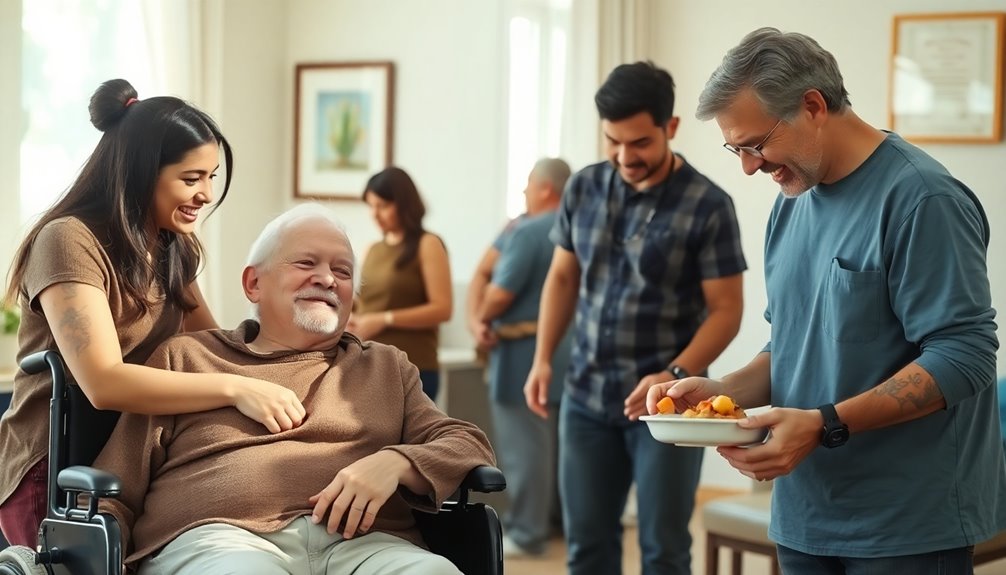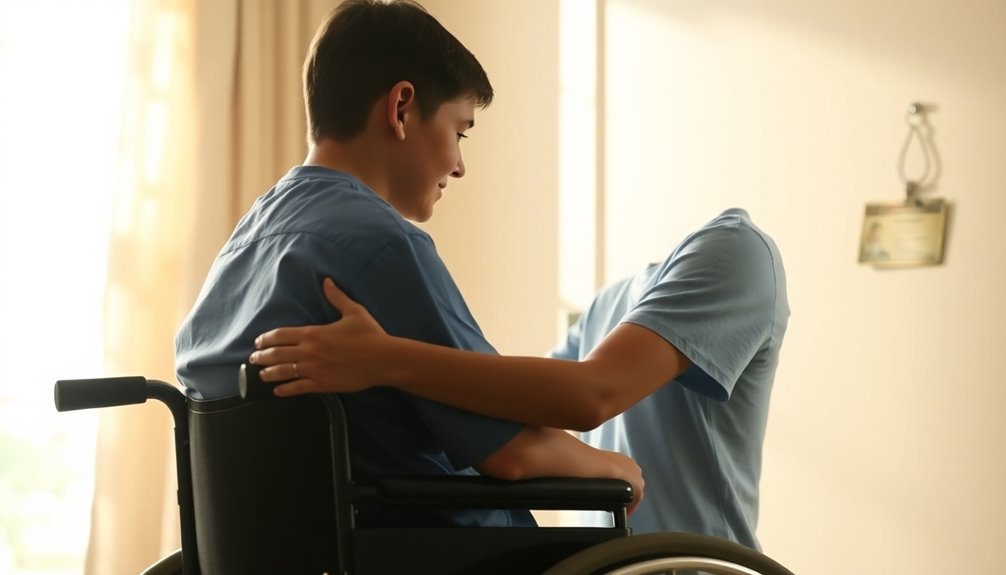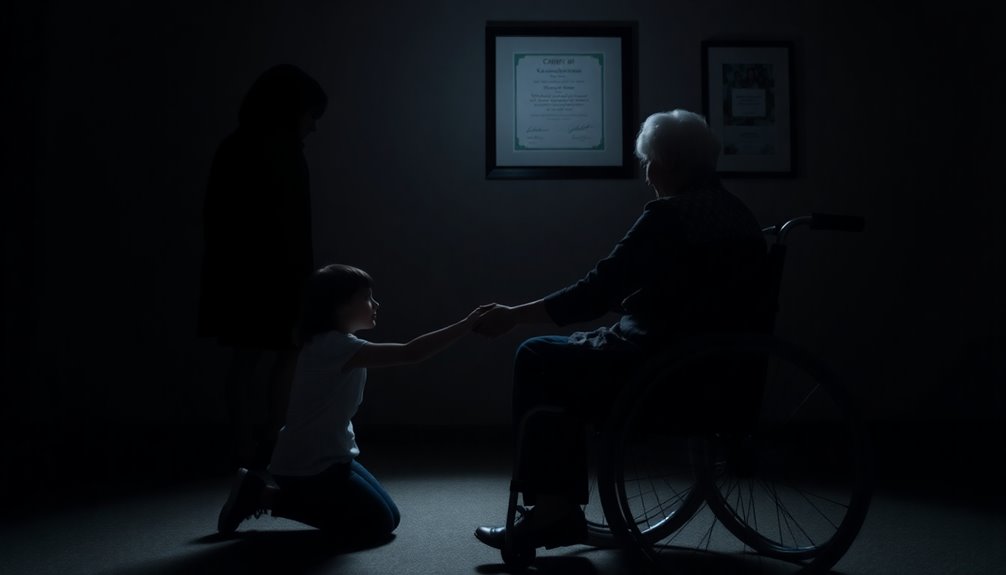Yes, you can be a caregiver with a felony, at 17, or without a license, but it may depend on state laws and specific employer requirements. Many states have restrictions for felons, though some offer exceptions. If you're 17, parental consent usually allows you to work. Unlicensed caregivers can assist with daily tasks, but medical duties require certification. Want to learn about strategies to improve your chances and resources available for aspiring caregivers?
Key Takeaways
- Employment as a caregiver with a felony largely depends on state laws, with some states imposing strict bans while others may allow exceptions.
- Many states permit 17-year-olds to work as caregivers with parental consent, offering roles like babysitting or companionship for the elderly.
- Unlicensed caregivers can assist with daily living tasks but cannot perform medical duties without certification, and background checks are still required.
- Obtaining proper training and certification enhances employability for felons and unlicensed caregivers, making them more appealing to employers.
- Networking with support programs and gathering strong references can improve job prospects for individuals with criminal records or those without licenses.
Overview of Caregiving Jobs and Requirements

When you consider a career in caregiving, you'll find that this field offers a variety of roles tailored to different populations, such as the elderly and individuals with disabilities.
Common caregiving jobs include Home Health Aides, Personal Care Aides, Nursing Assistants, and Psychiatric Aides.
The requirements for caregiving typically involve a high school diploma or GED, relevant coursework in healthcare, and sometimes specific certifications like Certified Nursing Assistants (CNAs).
Extensive background checks are mandatory to guarantee that caregivers provide safe, trustworthy support to vulnerable individuals.
Employers often offer on-the-job training, equipping you with the practical skills needed for success.
Keep in mind that felony convictions may affect your eligibility, depending on the specific requirements for caregiving in your area.
State Laws on Felons as Caregivers

How do state laws impact felons seeking caregiving jobs? The regulations surrounding felons working as caregivers vary greatly across states. Some impose strict bans on individuals with felony convictions, like Kansas and South Carolina, preventing them from obtaining caregiving positions.
Other states may allow exceptions, depending on the nature of the felony. Additionally, many states require a waiting period after a felony conviction, which can range from a few years to a lifetime ban for certain crimes.
However, a few states provide pathways for felons, enabling them to apply for special approvals or waivers to demonstrate their rehabilitation. Understanding these specific state laws is essential for felons to navigate their opportunities in caregiving effectively.
Challenges Felons Face in Caregiving Employment

If you have a felony record, you might find it tough to land a job in caregiving due to strict employment restrictions.
Many employers prioritize safety and trust, which can lead to hesitation in hiring someone with a criminal background.
This stigma not only affects your chances but also shapes how potential employers perceive your reliability and character.
Employment Restrictions Overview
While many people seek fulfilling careers in caregiving, felons often face intimidating employment restrictions that can make this goal challenging. State laws may impose blanket bans or specific restrictions based on your criminal record, limiting opportunities.
Caregivers must also navigate extensive background checks that often reveal past convictions, further hindering your chances of employment. Many care agencies prioritize candidates without felony convictions, driven by concerns from clients and families about safety and reliability.
This stigma can leave you feeling discouraged, but consider seeking roles in smaller private agencies, as they may have more lenient hiring policies compared to larger institutions.
With determination, you can still find a fulfilling path in caregiving despite these challenges.
Stigma and Trust Issues
Despite the dedication many felons bring to caregiving, the stigma surrounding their criminal histories often creates significant barriers to employment.
You might find that families and employers hesitate to trust caregivers with a criminal background, especially in sensitive roles. Research shows that 70% of employers are reluctant to hire individuals with felony records, amplifying trust issues in this intimate field.
Caregiving agencies frequently enforce strict hiring policies that exclude felons, limiting your job opportunities and perpetuating this stigma.
As a felon seeking a caregiving position, you'll need to work hard to prove your reliability and competence, overcoming preconceived notions about your past while demonstrating your commitment to providing safe and compassionate care.
Strategies for Felons to Enter the Caregiving Field

Entering the caregiving field as a felon can be challenging, but with the right strategies, you can overcome obstacles and build a successful career.
Here are some essential steps to contemplate:
- Seek proper training and certification to enhance your employability.
- Understand state-specific laws regarding felon employment in caregiving roles.
- Highlight your rehabilitation efforts and any relevant caregiving experience in applications.
- Network with support programs focused on helping felons reintegrate into the workforce.
Tips for Felons Seeking Caregiving Jobs

If you're a felon looking for a caregiving job, focusing on your rehabilitation efforts can really set you apart. Researching employers who are open to hiring felons is essential, as some may offer more flexibility than larger organizations. Additionally, demonstrating your commitment to financial stability can help you stand out as a reliable candidate.
Highlight Rehabilitation Efforts
As you navigate the path to securing a caregiving job, showcasing your rehabilitation efforts can greatly boost your appeal to employers. Here are some effective strategies to highlight your commitment:
- Obtain letters of recommendation from credible references, like former employers or community leaders.
- Highlight your caregiving skills through certifications and relevant volunteer work to demonstrate your competence.
- Share personal stories of transformation that illustrate your learning and growth from past mistakes.
- Participate in support groups or mentorship programs to show ongoing commitment to your rehabilitation and professional development.
- Engaging in self-care practices can also reinforce your readiness for the demands of caregiving and demonstrate your commitment to personal wellness.
Research Felon-Friendly Employers
Finding the right employer can make all the difference in your caregiving job search, especially if you have a felony record.
Start by researching local and smaller caregiving agencies, as they often have more flexible hiring policies and might be open to hiring felons.
Utilize online job boards like FelonyFriendlyJobs.net, which connect you with felon-friendly employers.
Networking within community organizations and support groups can also lead to job opportunities in personal care, as they often know of supportive employers.
Don't forget to gather letters of recommendation that showcase your rehabilitation efforts.
Highlight any relevant training and volunteer experiences, as these qualifications can greatly boost your appeal to potential employers willing to overlook criminal records.
Caregiving Opportunities for 17-Year-Olds

While many people might assume that caregiving jobs are reserved for adults, 17-year-olds can find a variety of opportunities in this rewarding field.
Here are some roles you might consider:
- Babysitter for families in your community
- Companion for the elderly who need social interaction
- Assistant in home care settings, helping with activities of daily living
- Support staff for smaller agencies or family-owned businesses
In many states, you can work as a caregiver or personal care aide with parental consent.
While formal certifications like CNA are typically for those 18 and older, some states offer training for minors.
Employers may even provide on-the-job training, allowing you to gain valuable experience while you provide care.
Working as a Caregiver Without a License

If you're considering a career in caregiving but lack a formal license, you might be in luck, as many states allow individuals to work in non-medical caregiving roles without one. However, it is crucial to understand specific regulations in your state. Unlicensed caregivers can assist with daily living tasks but may not perform medical duties requiring certification. Employers often prefer or require certification, as it shows a basic understanding of caregiving practices. Plus, you'll likely face background checks, just like licensed professionals. Here's a quick overview:
| Aspect | Unlicensed Caregivers | Requirements |
|---|---|---|
| Daily Living Tasks | Yes | Compliance with regulations |
| Medical Duties | No | Certification recommended |
| Background Checks | Yes | Same as licensed caregivers |
Importance of Background Checks in Caregiving

Understanding the qualifications for caregivers goes beyond just licensing; background checks play an essential role in guaranteeing safety and trust in caregiving environments.
These checks help protect vulnerable populations by revealing critical information.
Here's why they matter:
- They uncover criminal convictions and pending cases.
- They identify listings in abuse registries that signal risks.
- They guarantee compliance with federal laws like the Fair Credit Reporting Act.
- They help employers assess a candidate's suitability for caregiving roles.
Resources for Aspiring Caregivers With Criminal Records

Many aspiring caregivers with criminal records may feel discouraged about their job prospects, but there are numerous resources available to help you navigate the path to employment in this essential field.
Organizations like the National Employment Law Project offer guidance specifically for individuals like you, seeking caregiving roles. Local community colleges and vocational schools provide job training programs that can assist you in the application process.
Nonprofits focus on connecting you with job training and placement services tailored for healthcare. Online platforms, such as Care.com and Indeed, can help you find mentoring and networking opportunities.
Additionally, legal aid organizations offer free or low-cost advice to help you understand your rights and regulations surrounding caregiving employment in your state. Seeking professional counseling when needed can also be beneficial in addressing any emotional challenges you may face during this journey.
Frequently Asked Questions
Can You Work in Home Health Care With a Felony?
Yes, you can work in home health care with a felony, but it might be challenging.
Many employers conduct background checks, and certain felonies can disqualify you, especially those related to abuse or neglect.
However, smaller agencies may be more open to hiring you.
Focus on obtaining relevant training and certifications, and demonstrate your rehabilitation efforts to improve your chances of getting a job in this field.
Can a Felon Work as a Caregiver?
You might be surprised to learn that a felon can work as a caregiver, but it depends on your state's laws and your specific conviction.
Some states have strict bans, while others allow exceptions after a certain period. If you've got relevant training or certifications, highlight those during your job search.
Smaller agencies may also be more open to hiring you, so it's worth doing some research on potential employers.
Can a Convicted Felon Work in a Nursing Home?
Yes, a convicted felon can work in a nursing home, but it depends on state laws and the nature of the felony.
Some states allow it after a waiting period or if you demonstrate rehabilitation. Nursing homes conduct background checks, so you'll need to be aware of your state's regulations.
If your felony isn't violent and some time has passed, consider applying to smaller facilities that might be more flexible with their hiring practices.
Can You Work in Healthcare With a Felony?
Yes, you can work in healthcare with a felony, but it depends on your state's laws and the nature of your conviction.
Some states allow individuals with felony records to apply for certain positions, while others have strict restrictions.
You'll likely need to demonstrate rehabilitation, complete relevant training, and possibly obtain certifications to improve your chances.
Being transparent about your history during the application process is essential for gaining trust with potential employers.
Conclusion
To sum up, you can pursue a caregiving career despite a felony, your age, or the absence of a license. You can explore opportunities, build your skills, and connect with supportive resources. You can overcome challenges, embrace your strengths, and create a positive impact in the lives of others. Remember, your past doesn't define your future; your dedication and compassion do. So take the leap, stay determined, and open the door to a rewarding caregiving journey.









